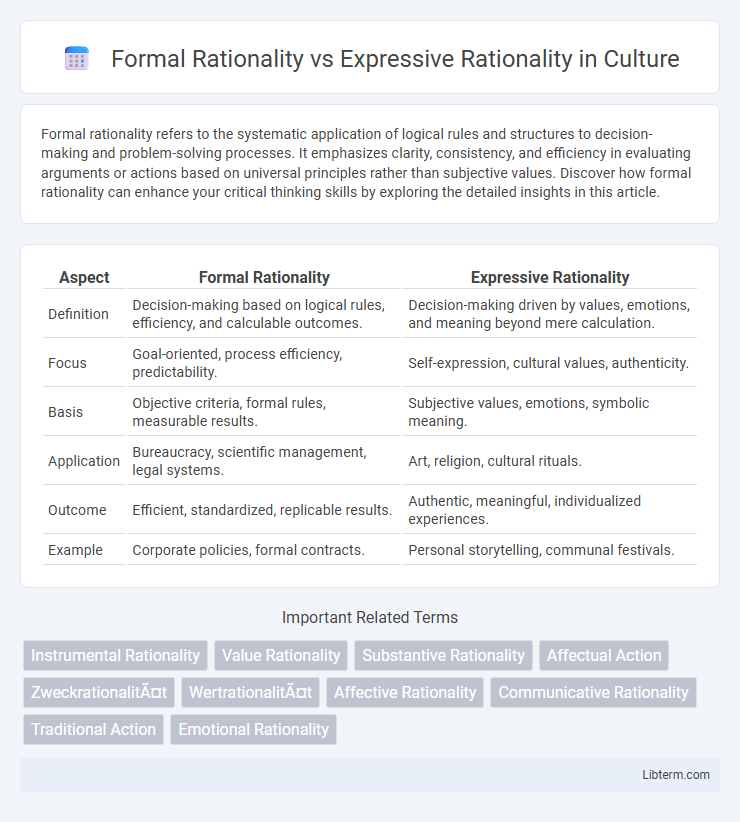Formal rationality refers to the systematic application of logical rules and structures to decision-making and problem-solving processes. It emphasizes clarity, consistency, and efficiency in evaluating arguments or actions based on universal principles rather than subjective values. Discover how formal rationality can enhance your critical thinking skills by exploring the detailed insights in this article.
Table of Comparison
| Aspect | Formal Rationality | Expressive Rationality |
|---|---|---|
| Definition | Decision-making based on logical rules, efficiency, and calculable outcomes. | Decision-making driven by values, emotions, and meaning beyond mere calculation. |
| Focus | Goal-oriented, process efficiency, predictability. | Self-expression, cultural values, authenticity. |
| Basis | Objective criteria, formal rules, measurable results. | Subjective values, emotions, symbolic meaning. |
| Application | Bureaucracy, scientific management, legal systems. | Art, religion, cultural rituals. |
| Outcome | Efficient, standardized, replicable results. | Authentic, meaningful, individualized experiences. |
| Example | Corporate policies, formal contracts. | Personal storytelling, communal festivals. |
Introduction to Rationality: Formal vs Expressive
Formal rationality emphasizes systematic, rule-based reasoning guided by logic and efficiency, commonly found in bureaucratic and economic decision-making processes. Expressive rationality centers on actions reflecting individual values, emotions, and identity, prioritizing meaning and authenticity over purely instrumental goals. Understanding this distinction clarifies how decisions can be driven by adherence to objective criteria or by personal and cultural expression.
Defining Formal Rationality
Formal rationality refers to decision-making processes governed by strict adherence to rules, procedures, and logical consistency, emphasizing efficiency and predictability in achieving specific goals. It prioritizes calculable and measurable criteria, often associated with bureaucratic structures and systematic problem-solving. This form of rationality contrasts with expressive rationality, which centers on values, emotions, and subjective meanings behind human actions.
Understanding Expressive Rationality
Expressive rationality centers on individuals making decisions based on values, emotions, and social identity rather than solely on logical calculation or efficiency. It emphasizes the importance of self-expression and symbolic meaning in shaping choices, where personal and cultural significance outweigh objective outcomes. This form of rationality is crucial for understanding behaviors motivated by identity affirmation and communal norms rather than purely instrumental goals.
Historical Context of Rationality Theories
Formal rationality, rooted in Max Weber's early 20th-century work, emphasizes efficiency, calculability, and rule-based decision-making prevalent during the rise of industrial capitalism. Expressive rationality, emerging from symbolic interactionism and cultural sociology, highlights the role of values, emotions, and subjective meaning in human actions, reflecting historical shifts toward individualism and postmodern critiques of instrumental reason. The historical context of rationality theories illustrates a transition from purely objective, system-oriented models to more nuanced understandings of human behavior incorporating social and cultural dimensions.
Key Differences Between Formal and Expressive Rationality
Formal rationality prioritizes systematic, rule-based decision-making grounded in logic and efficiency, often emphasizing measurable outcomes and universal standards. Expressive rationality centers on the pursuit of values, emotions, and personal or cultural expression, valuing authenticity and meaning over strict adherence to rules. The key difference lies in formal rationality's focus on objective calculation and predictability, whereas expressive rationality highlights subjective experience and value-driven actions.
Applications of Formal Rationality in Modern Society
Formal rationality governs decision-making through systematic rules, procedures, and efficiency criteria, making it essential in legal systems, bureaucratic organizations, and economic models. It enables consistent evaluation and optimization of processes, from algorithm-driven financial markets to standardized industrial production. The widespread adoption of formal rationality fosters predictability and control in complex societal operations, advancing technological innovation and institutional governance.
The Role of Expressive Rationality in Culture and Identity
Expressive rationality emphasizes values, emotions, and self-expression as central to cultural identity, shaping how individuals relate to their communities and traditions. It drives cultural innovation and preservation by allowing people to articulate personal and collective meanings beyond mere instrumental calculations. This form of rationality reinforces social cohesion and individual authenticity within diverse cultural frameworks.
Case Studies: Formal vs Expressive Rationality in Action
Case studies highlight formal rationality through bureaucratic systems where efficiency, rules, and calculable procedures dominate decision-making processes, exemplified by corporate logistics and government administration. In contrast, expressive rationality emerges vividly in social movements and artistic collaborations, prioritizing personal values, emotional expression, and identity over strict efficiency. These contrasting approaches reveal how formal rationality drives systematic outcomes while expressive rationality fosters innovation and cultural meaning in complex social contexts.
Criticisms and Limitations of Each Rationality Type
Formal rationality, characterized by efficiency and calculability, faces criticism for its reductionist approach, often neglecting human values and contextual nuances, leading to rigid and impersonal outcomes. Expressive rationality emphasizes meaning and authenticity but is limited by potential subjectivity and emotional bias, which can undermine objective decision-making and result in inconsistency. Both forms struggle to balance systematic reasoning with human complexity, highlighting the need for integrated approaches in social and organizational analyses.
Conclusion: Integrating Formal and Expressive Rationality for Balanced Decision-Making
Integrating formal rationality, which emphasizes logical consistency and systematic analysis, with expressive rationality, centered on personal meaning and emotional values, fosters balanced decision-making by aligning objective criteria with subjective insights. This synthesis enhances the ability to navigate complex situations where purely analytical approaches may overlook human factors, while purely expressive methods may lack structure. Embracing both rationalities supports decisions that are both reasoned and resonant, improving outcomes in diverse contexts such as organizational strategy and personal choices.
Formal Rationality Infographic

 libterm.com
libterm.com